Last Updated: 4 months ago
Let’s discover how to prevent separation anxiety in cats.
It’s among the most common search terms for lots of new cat owners.
If you’re one of those frantic Googlers, stick around.
We’ll go over everything from causes and prevention to treatment options if all your best efforts don’t quite succeed.
How to Prevent Separation Anxiety in Cats
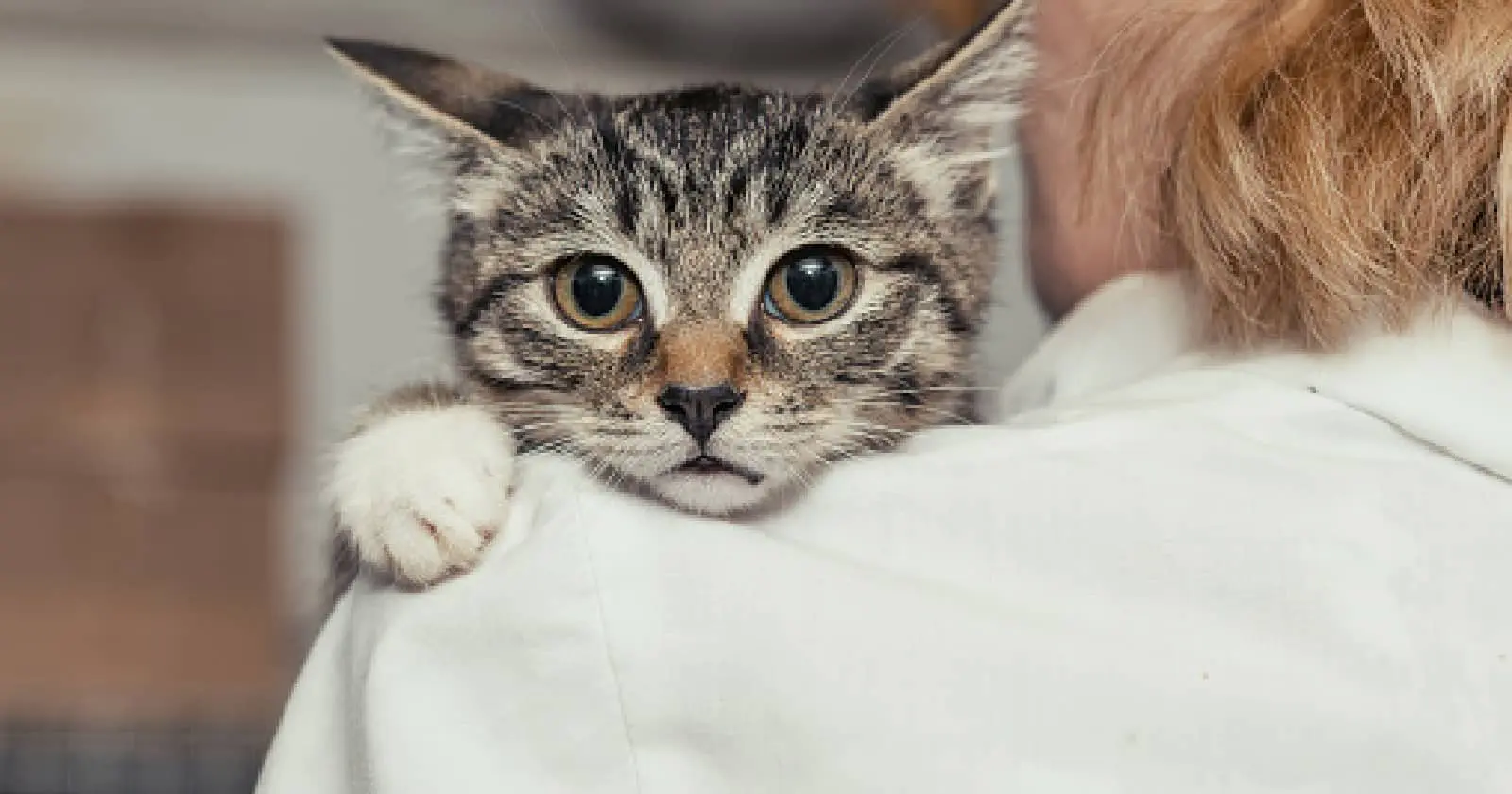
With the running joke around the globe being that cats are aloof animals who allow us to exist within their territory, it might come as a surprise to some to learn that cats can and do experience separation anxiety.
In fact, it’s far more common than you might think.
That’s because, contrary to popular belief, cats are actually incredibly affectionate and love their families.
Of course, some cats are far more independent than others, but even the most fiercely independent feline bonds with her family.
When the family has to leave, whether for a few hours or a few days, it can be quite traumatizing for some cats.
Just like some dogs, there are many cats out there that just can’t handle being left alone.
So today we’re going to talk about how to prevent separation anxiety in cats, especially kittens, along with what causes it and how to treat it if you can’t prevent it in the first place.
What is Cat Separation Anxiety?
Cat separation anxiety is similar to separation anxiety in dogs.
Without the reassurance of the sights and sounds of the family around them, some cats succumb to separation anxiety.
When the family leaves the home, the cat becomes agitated and/or fearful.
This fear and agitation can ramp up the longer the family is away.
Signs of Separation Anxiety in Cats
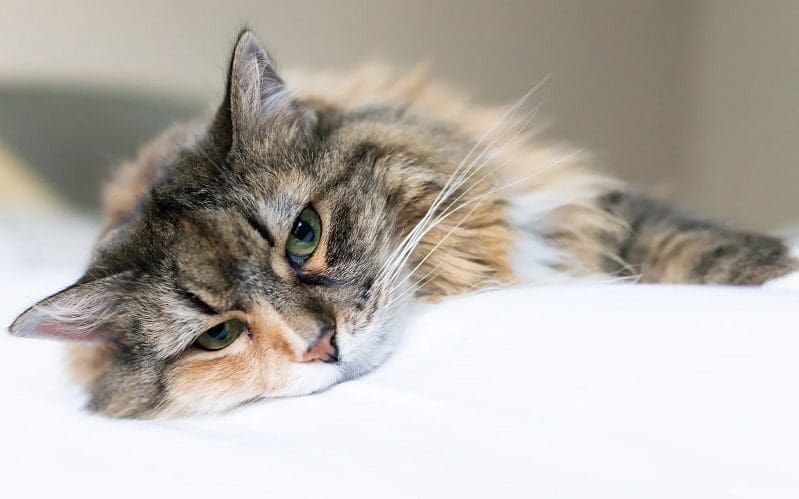
Cats display many of the same signs of separation anxiety that dogs show. It’s just a bit tougher to recognize at first.
Due to cats’ relatively laid-back attitudes when their owners are at home, it can often take the family some time to realize that their cat has separation anxiety.
Instead, they jump to the conclusion that their cat is “mad” or “having an attitude.” They might also think that their cat is simply bored.
However, if your cat shows any of the symptoms below, she might have separation anxiety.
It’s important to note that some of these signs can also be indicative of other underlying health issues, so it’s imperative that you take your cat to the vet to rule these out and to verify that your cat may be suffering from separation anxiety.
- Excessive vocalization, such as crying, meowing, moaning, or a combination of these.
- Urination or defecation in inappropriate places
- Not eating or drinking while the family is away.
- Excessive self-grooming. Look for patches of thin or missing hair due to excessive licking.
- Vomiting, often containing food or hair.
- Eating too fast.
- Destructive behavior.
- Excessively excited when owners return home.
What Causes Cats to Have Separation Anxiety?
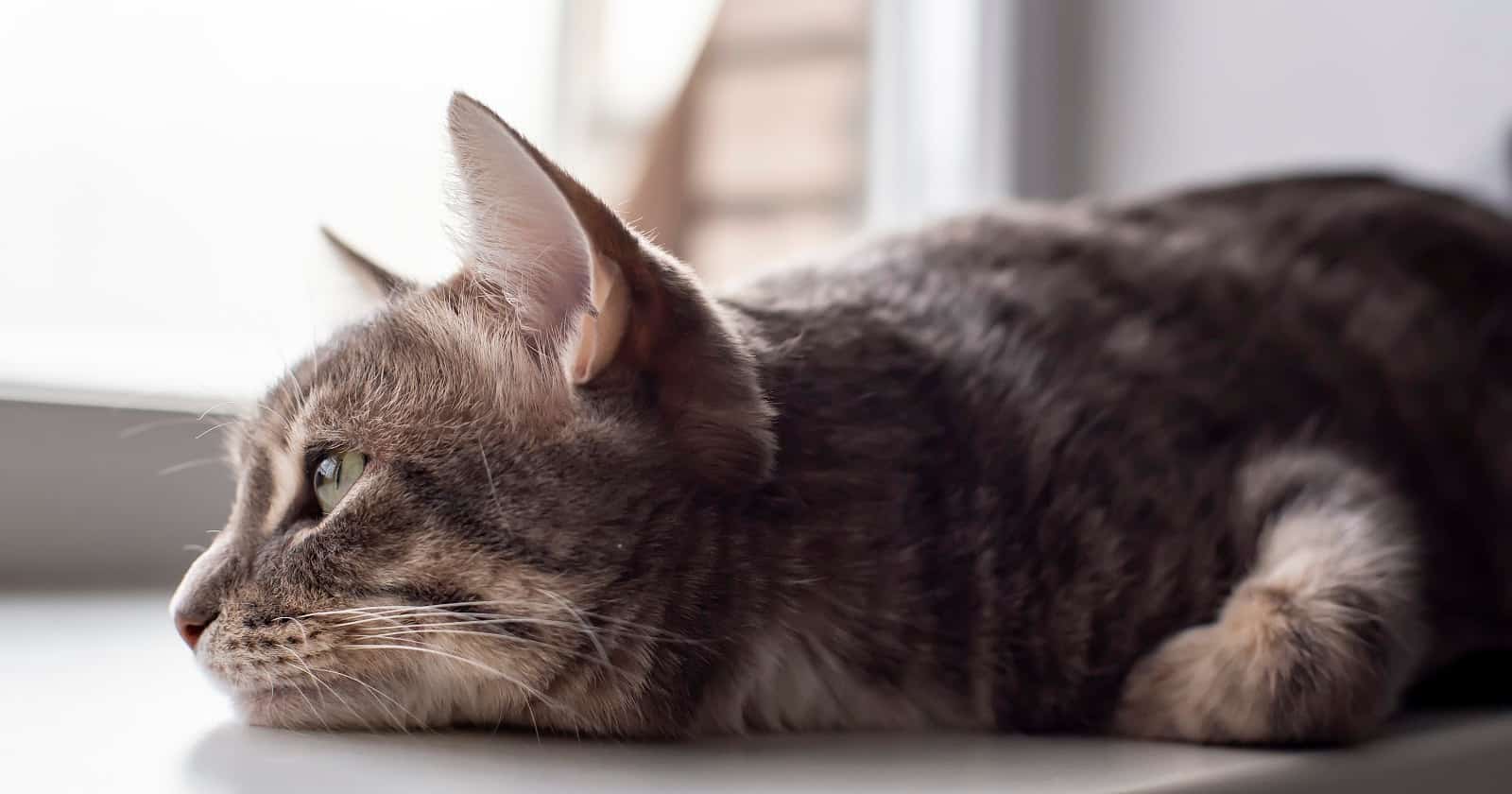
Just like dogs, cats can have separation anxiety. However, the reason for their anxiety is different than that of dogs.
Dogs are very dependent on their family unit, and as a result, their separation anxiety stems mainly from being away from “the pack.”
It’s unnatural for them to be away from their families, and for some dogs, this can cause separation anxiety.
Cats are more independent animals, so their separation anxiety stems from other issues.
#1 Breed
In the same way that certain dog breeds are more prone to separation anxiety, certain cat breeds are prone to this issue as well.
Breeds like Burmese and Siamese cats, which bond heavily with their families, are prime examples.
#2 Early Life
If a kitten was weaned or re-homed early in her life, she can be more prone to separation anxiety due to a lack of confidence and independence and a need for heavy structure to feel safe.
#3 Lack of Stimulation
Cats are hunters and have a large territory compared to their size when they live outside.
Indoor cats don’t have this constant stimulation of roaming and exploring and require more physical and mental stimulation.
A lack of these two things can lead to separation anxiety when cats are left to their own devices.
#4 Owners
An exacerbation of the issue is a common problem among owners of dogs or cats with separation anxiety.
Owners tend to try to reassure their animals, but what this actually does is ramp up the anxiety, creating a build-up to the time when the owner leaves the house and resulting in a cat that is wound up tight as a spring.
Triggers of Cat Separation Anxiety
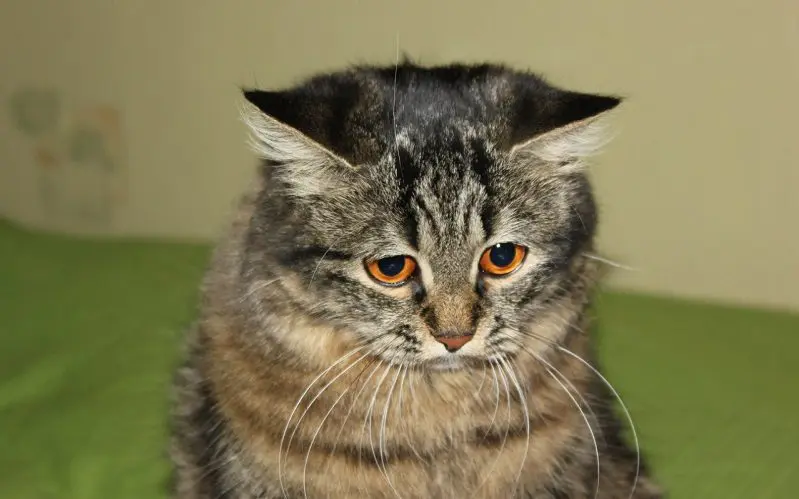
If you want to know how to prevent separation anxiety in cats, it’s important to understand the triggers of this condition.
As referenced above, there are common causes of separation anxiety to be present in our cats.
However, there are also triggers that are specific to our lives that can cause that anxiety to come to the forefront.
For example, if you’re cat has separation anxiety, but there is always someone in the home, you may never know this condition is lurking within your cat.
It’s important to figure out exactly what’s causing your cat’s separation anxiety so you can address it.
#1 Cat Separation Anxiety on Vacation
Vacations can obviously be a massive trigger for separation anxiety.
The family will be gone for at least a few days to a week, leaving the cat at home alone to be checked in on or taken to a boarding facility.
#2 Cat Separation Anxiety at Night
Some owners don’t allow their cats to sleep in bed at night. This can trigger separation anxiety in some cats.
They’ve been allowed to snuggle all day with the family, but then at night, they’re left alone.
#3 Kitten Separation Anxiety from Mother
As we noted above, early weaning or separation from the mother can affect a kitten’s mental state for the rest of her life.
While cats are independent, they still need that nurturing time with their mothers in the first few weeks.
Without it, they can have lowered confidence and a propensity for separation anxiety.
#4 Cat Separation Anxiety After Quarantine
Be vigilant about your cat’s behavior as you head back to work after quarantine.
Remember, your cat has had months of nothing but time with the family.
For some cats, it might be a trigger to have the family suddenly leave all day again.
How to Prevent and Treat Separation Anxiety in Cats
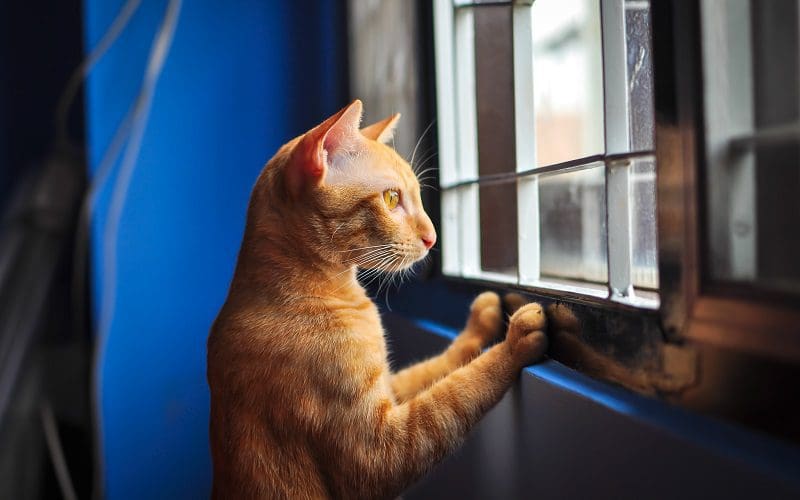
The following tips will help you understand how to prevent separation anxiety in cats.
The core of all of these tips is about making your departure as anxiety-free as possible. From being casual about departing the home to giving your cat extra exercise.
The following recommendations will help you remove as much stress as possible for your cat when it’s time for you to leave the home.
Essentially, these treatments are both prevention and treatment for your cat.
#1 Start Early
If you’ve just adopted a kitten, in addition to giving her plenty of love, give her plenty of space.
Practice leaving the house early and often. Get her used to the routine of the family coming and going early so she won’t be stressed out later.
#2 Be Casual
Don’t try to reassure your cat with whispered words like “I’ll be right back” or extra cuddles. Simply leave quietly.
It’s important to remember that extra cuddles and reassurances only serve to ramp up your cat’s anxiety.
#3 Desensitization to Triggers
If your cat has specific triggers like the sound of car keys or picking up a purse or wallet, work towards desensitizing your cat to them.
Pick up your keys or walk around with the trigger object multiple times a day.
This shows your cat that you don’t always leave when you grab these objects.
#4 Desensitization to Departure
Practice coming and going multiple times a day. Walk out your door, and then immediately return.
Every time you walk back into the house, greet your cat casually; don’t overdo it.
A simple scratch or a mini-play session will do. Vary the times of day you do this and gradually increase the time you remain outside.
#5 A More Enriching Environment
Consider getting putting a cat tree next to a window and/or adding cat perches to windowsills so your cat can look out the window while you’re gone.
Wildlife, passersby, and simply being able to jump and climb can help alleviate stress.
#6 Puzzle Feeders
Put down puzzle feeders while you’re away and fill it with extra special treats.
The treats provide a positive spin to your departure, and the puzzle feeder adds mental stimulation.
#7 Positive Reinforcement
When you return, ignore your cat’s protests and anxiety-filled behavior. When your cat calms down, immediately give her a scratch and a treat.
This reinforces the idea that good things happen when she remains calm.
#8 Exercise
Play with your cat vigorously when you’re at home.
This extra physical stimulation will help your cat work off excess energy, leaving her with a more shallow well of nervous energy when you’re gone.
#9 Leave a Little Piece of Yourself at Home
It can sometimes be helpful to leave a shirt you’ve worn on your cat’s tree or in another spot.
Your scent will be on the object which can help alleviate some of her stress.
#10 Familiar Background Sounds
Leave the TV or radio on when you leave, putting them on the stations you normally listen to.
#11 Pheromones
Cat pheromone diffusers like Feliway release calming pheromones into the air which can help with your cat’s stress.
They’re as simple as plugging them into a wall outlet, working in the same way that plug-in air fresheners do.
#12 Get a Second Cat
If you’re adopting a kitten, consider adopting one of her littermates, as well.
Both cats will always have a buddy to play with when you’re away.
If you have an adult cat that is generally laid-back, adopting a second cat is also an option.
Make introductions slowly, but if your cat has the right personality to share the home, having a buddy around can drastically alleviate the stress of the family being gone.
#13 Consult Your Vet
If your cat’s separation anxiety persists, contact your vet.
There are medication options available, and your vet might also know a cat behavioral specialist who can provide more personalized help for your unique situation.
You Can Help Your Cat with Separation Anxiety
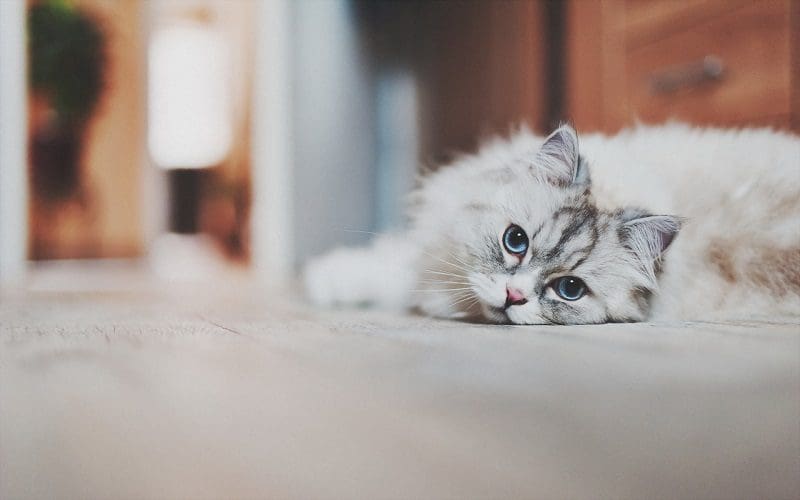
From adopting two cats right out of the gate to avoiding triggers, using pheromones, and using positive reinforcement, there are things you can do to help prevent or minimize the effects of separation anxiety in your cat.
Perhaps the most important thing to remember about how to prevent separation anxiety in cats is to start getting your kitten used to the family leaving early on.
Practice coming and going early and often, having the entire family leave the house for very short periods, and then gradually increasing that length of time.
This sets your kitten up to know that you won’t always be there.
In addition to early training, follow the tips above, and you’ll be able to prevent, or at least minimize, separation anxiety in your feline friend.
Do you have any other tips on how to prevent separation anxiety in cats? Share below!
Resources:


